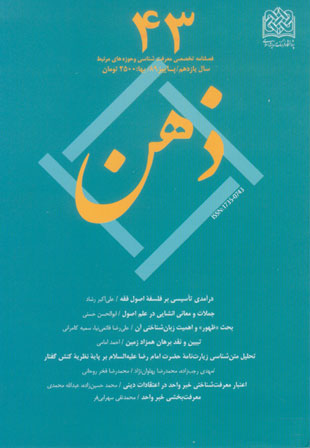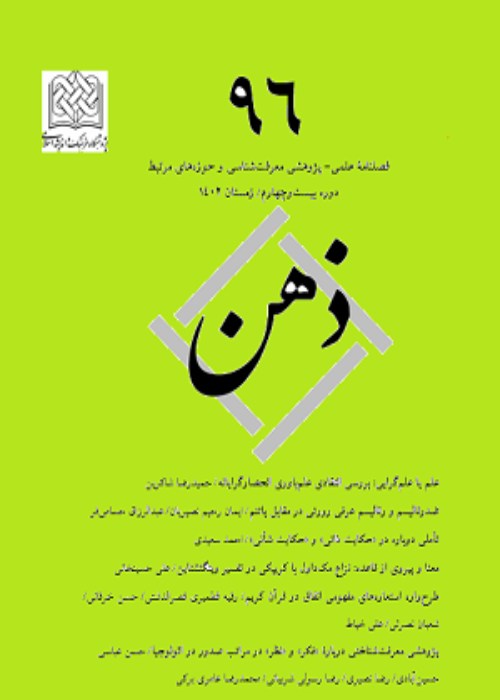فهرست مطالب

فصلنامه ذهن
سال یازدهم شماره 3 (پیاپی 43، پاییز 1389)
- 208 صفحه، بهای روی جلد: 25,000ريال
- تاریخ انتشار: 1389/08/18
- تعداد عناوین: 7
-
صفحه 47
-
صفحه 77
-
صفحه 95
-
صفحه 169
-
Page 5In addition to development of various containers and angles of human life, up-to-dateness and functionality of jurisprudence, depends upon development of the logic of inference of shariah. Any evolutionary development in jurisprudence presupposes development and upgrade of methodology of juridical inference. And development and evolution in the methodology of inference is based on revision and extension of the foundations of the discipline of principles [of jurisprudence]. Development and deepening of the foundations of the principles of jurisprudence can (and should) take place in the form of establishment of the philosophy of principles of jurisprudence. Philosophy of principles of jurisprudence is "rational, meta-scientific, meta-problematic study of the principles of jurisprudence to find general rules and problems of this discipline". Concerned for long with the methodology of understanding religion and development in the religious knowledge and research in this field, and provided his opinions to develop and complete the discipline of the principles of jurisprudence, the author of this article has tried to, through an establishing approach, design "philosophy of the principles of jurisprudence" as a discipline independent from disciplines of jurisprudence and principles of jurisprudence. Issues in the discipline of principles of jurisprudence, the author of the present article thinks, are divided into two groups: meta-scientific and meta-problematic. The philosophy of principles of jurisprudence explains and analyzes "general rules of the discipline of principles of jurisprudence as a discipline" in a rational way; and, as a methodological system of inference of jurisprudence, it studies close and intermediate foundations of "the most important" issues in this discipline. In the present article, at first, the author goes to study the epistemological-historical process of developments of the foundations of the principles of jurisprudence, criticize research foundations for scholars of the principles of jurisprudence, and explains that why the philosophy of principles of jurisprudence should be established. Then, he classifies and divides issues, arranges them perfectly, and provides a detailed list of issues in the discipline of the philosophy of principles of jurisprudence. It should be noted that the author welcomes critical opinions of the scholars concerning claims made in the present article.Keywords: philosophy of, principles of jurisprudence, philosophy of principles of jurisprudence, philosophy of jurisprudence, critique of principles of jurisprudence, development of the discipline of principles of jurisprudence
-
Page 47One of the preliminary issues in the "principles of jurisprudence" is definition of construction which is a fundamental lemma for a large part of this discipline. The author of the present article will discuss the issue in two parts: constructive meanings or mentally-posited concepts and constructive sentences. In the part concerning constructive meanings, 'Allamah Tabatabai's theory of mentally-posited concepts will be discussed; but, with the help of ideas of Ayatollah Sistani and those of Ayatollah Larijani it will be extended through some innovations. In the part concerning constructive sentences, three issues will be discussed: 1) status of these sentences in terms of words; 2) status of these sentences in terms of meanings; 3) objects of the constructive sentences. As for two first issues, the author inclines toward the well-known opinion and is of the opinion that constructive sentences are, in both respects, like the verbal meanings. Concerning the third issue, however, the author studies the important ideas of the later scholars of the principles of jurisprudence, criticizes them, and provides a doctrine which may be regarded both as an innovative one and as "making an agreement between various ideas while referring every idea back to its own status".Keywords: construction, perfect construction, legal concepts, constructive sentences
-
Page 77One of the important and extensively used issues in the principles of jurisprudence, which is of interest for linguists as well, is emergence, its originality, authority, whether or not the rule of "originality of emergence" is an argument, and how it influences linguistics. In the present article, the author has studied this point and researched in various doctrines posed by the scholars of the principles of jurisprudence concerning this rule.Keywords: emergence, authority, linguistic, principles of jurisprudence, reference, originality of emergence
-
Page 95In the present article, at first, the theory of direct reference concerning proper nouns will be discussed. Then, Hillary Putnam's ideas concerning direct reference of the words referring to natural kinds will be explained. In what follows, Putnam's understanding of the traditional theory of semantics and in particular Frege's semantic theory as well as his critiques of it will be discussed. In conclusion, the twin-earth argument will be explained and criticized in detail.Keywords: semantics, semantic externalism, theory of direct reference, causal theory of reference, twin, earth argument
-
Page 121The speech act theory is one of the most important theories influencing the two fields of philosophy of language and language of religion. John Austin, who introduced this theory, says that speech act is an act that is performed by making an utterance, as the issuing of a warning, the making of a promise, or the giving of a greeting. He said that it is the performance of the speech act that constitutes the basic unit of linguistic communication. On the basis of this theory, John Searle classified speech acts under five categories: representative, directives, commissives, expressives, and declarations. Textual analysis of this letter of pilgrimage showed that among 107 speech acts used in this text, there are 38 expressive acts, making this kind of speech act the most abundant ones in the text. And there are 22 declarations making them the least abundant ones. Also, it should be noted that no commisive speech act has been used in this text. The above results show a profound relation between the speaker of the pilgrimage letter and his audience. As a matter of fact, in this text, the speaker has tried to convey his emotions such as sincerity, appreciation, and friendship, to the audience. Negligible difference between the numbers of other speech acts used in this text, when compared to the total speech acts used, does not seem to be significant.Keywords: textual analysis, speech act theory, Austin, John Searle, Pilgrimage Letter of Imam Riza
-
Page 141Validity of a tradition about religious creeds which has a single transmitter is one of the most controversial issues in the philosophy of religion and religious epistemology. The main question concerning this issue is: "May be a tradition with a single transmitter regarded as one of the valid tools to acquire knowledge in the field of creedal issues?" Most methodologists, exegetes, and theologians think that a tradition with a single transmitter as such, has no validity, and some authority should be found for it. To find some authority and commit one's self to the content of such a tradition is reasonable and possible only in the field of obligations; thus, this kind of tradition has not validity concerning creeds. Opposing this point, 'Allamah Tabatabai thinks that such traditions do not need an authority to be found; and they are ways to acquire knowledge. The present article shows that, according to the two above bases, arguments posed against the validity of traditions with a single transmitter are not decisive. Demonstration of the epistemological validity of traditions with a single transmitter concerning religious creeds has opened a new chapter in methodology of creeds and establishment of the Islamic philosophy in its particular sense. In this way, the way is paved for Islamicization of humanities.Keywords: tradition with a single transmitter_religious creeds_epistemology of religious texts
-
Page 169Hadiths quoted from the Infallibles (pbut) are among the important sources of the religious sciences. On the other hand, creeds should be based on knowledge; and, this has caused a concern that whether or not, in the field of creeds, hadiths are cognitive. The present article tries to clarify that a hadith, if it has a single transmitter, cannot create the necessary knowledge in the field of creeds. The "knowledge" produced by this kind of hadiths will not be more than a conjecture; and this is not sufficient for the creedal propositions which make reports of the real world.Keywords: knowledge_hadith with a single transmitter_conjecture


